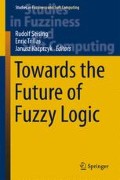Abstract
This paper just tries to look towards a particular aspect of fuzzy logic’s future. Namely, that concerning to the form in which its theoretic evolution should be followed up to approach, in a scientific manner, one of the greats desiderata in the way to Zadeh’s Computing with Words: the renewal of the old thought of making interact Fuzzy Logic and Natural Language Common Sense Reasoning. For such a way, and from the perspective of its author, it is argued that fuzzy logic deserves to move towards a new experimental science of linguistic imprecision and non-random uncertainty. A goal for which a critical review of some still open questions should be done, but not only taking as models those of logic and mathematics. The author thinks that a better model is that of physics, joining observation, controlled experimentation and mathematical models in the ground of language and ordinary reasoning, with the extensive use of computational technology and its applications to practical problems.
Access this chapter
Tax calculation will be finalised at checkout
Purchases are for personal use only
References
Kauffman, A.: Introductionà la théorie des sous-ensembles flous à l’usage des ingenieurs. Masson, Paris (1973)
Menger, K.: Ensembles flous et fonctions aleatoires. C.R. Acad. Sci. de Paris. 232, 2001–2003 (1951)
Zadeh, L.A.: Fuzzy sets. Inf. Control 8, 338–353 (1965)
de Luca, A., Termini, S.: A definition of a nonprobabilistic entropy in the setting of fuzzy sets theory. Inf. Control 20, 301–312 (1972)
Russell, B.: Vagueness. Aus. J. Philos. Psychol. 1, 84–92 (1923)
Boole, G.: The Mathematical Analysis of Logic, Being an Essay Towards a Calculus of Deductive Reasoning. Barclay and Macmillan, London (1847)
Boole, G.: An Investigation of the Laws of Thought on Which are Founded the Mathematical Theories of Logic and Probabilities. Macmillan, London (1854)
Menger, K.: Statistical metric spaces. Proc. Natl. Acad. Sci. USA 28(12), 535–537 (1942)
Wald, A.: On a statistical generalization of metric spaces. Proc. Natl. Acad. Sci. USA 29, 196–197 (1943)
Schweizer, B., Sklar, A.: Statistical metric spaces. Pac. J. Math. 10, 313–334 (1960)
Trillas, E.: Sobre funciones de negacién en la teoría de conjuntos difusos. Stochastica III(1), 47–60 (1979)
Trillas, E., Alsina, C., Renedo, E.: On some schemes of reasoning in fuzzy logic. New Math. Nat. Comput. 7(3), 433–451 (2011)
Trillas, E.: Non-contradiction, excluded middle, and fuzzy sets. In: Di Gesú, V., Pal, S.K., Petrosino, A. (eds.), Proceedings of the 8th International Workshop on Fuzzy Logic and Applications (WILF 2009) Palermo, Italy, June 9–12, Fuzzy Logic and Applications. LNCS (LNAI), vol. 5571. pp. 1–11, Springer, Heidelberg (2009)
Zadeh, L.A.: Computing with Words. Principal Concepts and Ideas, Springer, New York (2012)
Watanabe, S.: Knowing and Guessing. Wiley, New York (1969)
Wittgenstein, L.: Philosophical Investigations. Basil Blackwell, Oxford (1958)
Trillas, E.: Reflexions sobre ciència i magnitud. In: Levy, J. et al. (eds.) Festschrift en homenatge a Jaume Agustí, pp. 43–53, CSIC, Barcelona (2013)
Trillas, E., García Honrado, I.: A layperson reflection on sorites. In: Seising, R., Tabacchi, M.E. (eds.), Fuzziness and Medicine: Philosophical Reflections and Application Systems in Health Care, pp. 217–231, Springer, Berlin (2013)
Trillas, E.: On the genesis of fuzzy sets. Agora 27(1), 7–33 (2008)
Trillas, E., Guadarrama, S.: Fuzzy representations need a careful design. Int. J. Gen. Syst. 39(3), 329–346 (2010)
Trillas, E.; Moraga, C.: Reasons for a careful design of fuzzy sets. In: Proceedings EUSFLAT—Milano, pp. 140–145 (2013)
Trillas, E., Moraga, C., Termini, S.: A naïve look at fuzzy sets. Submitted to Fuzzy Sets Syst. (2014)
Medawar, P.: The Limits of Science. Harper, London (1984)
Trillas, E.: A model for ‘Crisp reasoning’ with fuzzy sets. Int. J. Intell. Syst. 27, 859–872 (2012)
Trillas, E., Alsina, C.: Paradoxes of fuzzy logic revisited. Int. J. Approx. Reason. 26, 157–159 (2001)
Trillas, E., Alsina, C.: Standard theories of fuzzy sets with the law \((a \cdot b^{\prime })^{\prime } = b + a^{\prime }\cdot b^{\prime }\). Int. J. Approx. Reason. 37(2), 87–92 (2004)
Garmendia, L., Yager, R.R., Trillas, E., Salvador, A.: Measures of fuzzy sets under T-indistinguishabilities. IEEE Trans. Fuzzy Syst. 14(4), 568–572 (2006)
Trillas, E., Cubillo, S., Castiñeira, E.: On conjectures in ortholattices. Artif. Intell. 1(7), 255–275 (2000)
Trillas, E.: Some uncertain reflections on uncertainty. Arch. Philos. Hist. Soft Comput. 1, 1–16 (2013)
Mamdani, E.H., Trillas, E.: Correspondence between an experimentalist and a theoretician. In: Trillas, E, et al. (eds.) Combining Experimentation and Theory, pp. 1–18, Springer, Berlin (2012)
Mendel, J., Zadeh, L.A., Trillas, E., Yager, R.R., Lawry, J., Hagras, H., Guadarrama, S.: What computing with words means to me (Discussion Forum). IEEE Comput. Intell. Mag., 20–26 (2010)
Acknowledgments
This paper is partially funded by the Foundation for the Advancement of Soft Computing, and by the Spain’s Government project MICIIN/TIN \(2011-29827-C02-01\).
Author information
Authors and Affiliations
Corresponding author
Editor information
Editors and Affiliations
Rights and permissions
Copyright information
© 2015 Springer International Publishing Switzerland
About this chapter
Cite this chapter
Trillas, E. (2015). On What I Still Hope from Fuzzy Logic. In: Seising, R., Trillas, E., Kacprzyk, J. (eds) Towards the Future of Fuzzy Logic. Studies in Fuzziness and Soft Computing, vol 325. Springer, Cham. https://doi.org/10.1007/978-3-319-18750-1_3
Download citation
DOI: https://doi.org/10.1007/978-3-319-18750-1_3
Published:
Publisher Name: Springer, Cham
Print ISBN: 978-3-319-18749-5
Online ISBN: 978-3-319-18750-1
eBook Packages: EngineeringEngineering (R0)

